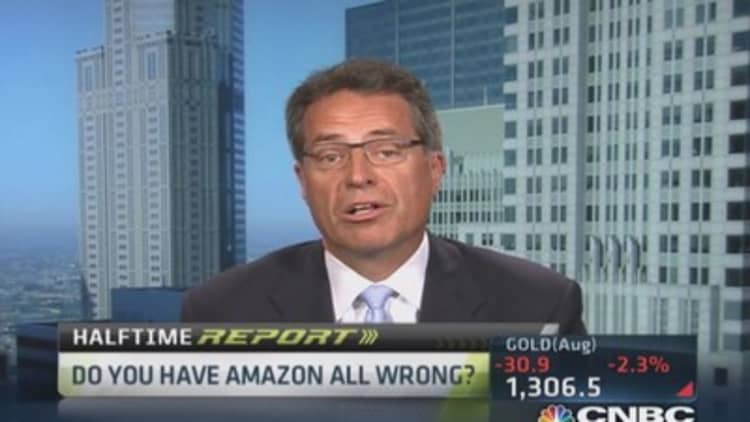
Did value investor Bill Nygren really just buy Amazon stock?
Nygren, portfolio manager of the $12 billion value-oriented Oakmark Fund, said Monday that Amazon's rapidly growing business, aggressive reinvestment and high-margin third-party sales make its shares—priced at 161 times forward price-to-earnings—a good bet.
"I think when you look at a company like Amazon, you have to distinguish between it and a steel mill," he said. "A steel mill decides that it wants to pursue growth, and it's building tons of plants and equipment. And that spending only comes through the income statement over 20- or 30-year life of the equipment that's being built."
Not so with Amazon, he said on CNBC's "Halftime Report."
"We think when you look at Amazon, instead of looking at what they're currently earning, it's useful to look at what the scale of the company is and how does it look on a price-to-sales basis. And if you adjust for the fact that a lot of their sales now are third-party, where they're basically getting income like a mall owner would, and you gross those sales up to a full gross sales rather than net sales, Amazon's actually selling at a pretty big discount to the average retailer," Nygren added. "And most investors are worried that the other retailers are at risk of going out of business because Amazon does their job so well. So, we think that's interesting."
Read MoreHow to find pockets of small-cap growth: Pro
Nygren said that a stock price around $400 per share, or 14 percent higher than its current price, would make it "priced like an average retailer relative to its sales base."
"We think it should be at a premium to that," he added. "And as long as sales keeps growing so much faster than the average retailer, each year it takes for the market to catch up with that valuation, the spread will keep growing."
Nygren said Amazon could be two to three times its size within five to seven years, which makes the company's reinvestment strategy a no-brainer.
"And for the shareholders, it's much better that they scale up and become two to three times the size they are now over the next five years than it would be to raise prices a little bit today, quit the R&D spending and then get a normal margin on the business they are today but then only grow like an average retailer," he said. "So, we're very supportive of management reinvesting to go after organic growth. Most companies don't have that opportunity."
—By CNBC's Bruno J. Navarro


